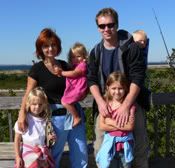 "Good morning, everybody!", Diane's cheerful greetings set a positive atmosphere right away.
"Good morning, everybody!", Diane's cheerful greetings set a positive atmosphere right away."Today we'll be mulching", she announced at the breakfast table, while we were gobbling up eggs on a sunny side, sausage, and drinking goat milk, as much as we could. (It was into our third day of stay that she had announced that they were running low on milk. Laughingly, she admitted that she hadn't said that in a long while.)
Oh, well, we'd better make sure we work off the food we are so generously treated with!
Farmer Phil has a special philosophy about weeding. Basically, they do not weed on "Nothing But Nature" farm, they mulch, instead.
When we came to the "garden by damn road" ("We call it this way, so that kids are allowed to say the word damn," Diane explained with a twinkle in her eyes.), it looked like there was nothing planted there. Weeds, weeds and more weeds everywhere! Tall, useless, ugly weeds! And then farmer Phil started educating us.
He showed us how to separate the strips of spoiled hay from the bales and use it to cover all the weeds around a garden plant. We had to make sure that all the weeds were covered and there was only an opening left for the stem of the plant.
Apparently, the weeds will not have a source of light to grow anymore, and would rot away under the layer of mulch. We were instructed not to walk on the rows unnecessarily, not to even press down with the hands to avoid compacting the soil too much.

Mulching not only helps with making sure the plants get the nutrients from decomposing weeds underneath the mulch, but also, mulch will help retain moisture. The morning dew and occasional rain will be soaked into the mulch and will be keeping the soil underneath moist at all times. It is believed, that that kind of growing approach is so much more beneficial for the plant, than "wet-dry", "dry-wet" growing conditions. So, Phil and Diane do not water.
"It would have been insane if we had to water the garden!" Exclaimed Diane answering my question about their watering techniques, as I did not see any irrigation system or rain collecting barrels nearby.
Neighbors would drop off last year's hay or straw that they no longer need or which got spoiled, in most cases, and couldn't be used for the barn animals. Every fall Phil cleans the park and other areas in town from the leaves, and ,thus, uses the piles and piles of leaves as mulch the next spring and summer.
When the vegetables are harvested later in the summer, the mulch is tilled into the soil, enriching it with nutrients, that are so needed to keep the soil healthy and fertile for the next year's crops.

There was also another area that needed to be taken care of badly. We all got scissors and went down on our knees to cut the weeds. The trick was to cut it as close to the root as possible, but then, in stead of throwing the weeds away, we were putting them along the plants, covering the area, using the weeds as mulch. It works the same way, as hay or straw mulch and serves the same purpose.
Once we were done and ready for our lunch, the area looked completely different! It looked taken care of and you could actually see the growing tomato plants. A job well done, and I left the garden very happy as it was a rather pleasing sight for my "everything must be neat" loving persona!

0 comments:
Post a Comment